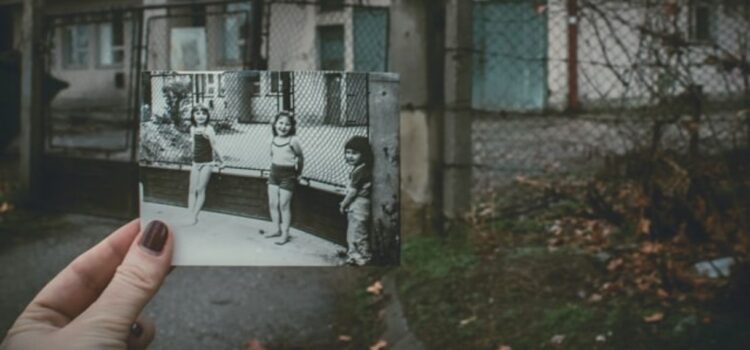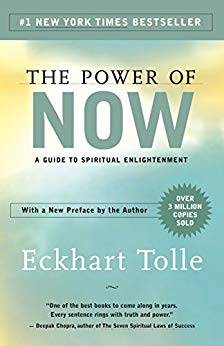

This article gives you a glimpse of what you can learn with Shortform. Shortform has the world’s best guides to 1000+ nonfiction books, plus other resources to help you accelerate your learning.
Want to learn faster and get smarter? Sign up for a free trial here .
Do you often find yourself lost in thought, falling down the rabbit hole of past memories? Are you stuck in the past?
The more you’re stuck in the past, the more you carry pain from your past moments into your present. Too much focus on the past creates guilt, regret, resentment, sadness, bitterness, and unforgiveness.
Here’s how to free yourself from the burden of the past so you can turn the page and move forward with your life.
The Past Exists Only in Your Mind
We give a lot of power and credence to the past: We tend to think the past shaped us. While that’s true to some extent, the past is just a concept: It exists only in our minds. When we dwell on the past, it takes away from the present, which is the only true experience.
Much of our unhappiness is caused by putting too much mental energy and attention on the past, instead of being present in our current reality. We don’t gain anything from dwelling on the past because we have no control over it—it’s too late to do anything about what happened in the past.
We get stuck in the past because it gives us a sense of identity, but that’s merely an illusion of the human mind. In contrast, look at nature: Plants and animals go through life in the present moment, living and dying without regret or anxiety about the future. They may learn from the past, but they don’t dwell on it. They are always engaged in the task at hand.
According to spiritual teacher Eckhart Tolle, there are two forms of time: clock time and psychological time.
Clock Time
Clock time is used for practical purposes, like making appointments, learning from the past, setting goals, and predicting/planning for the future. Clock time is always tied to impacting how you act in the present. When you set and pursue goals in clock time, you’re present and in touch with your true self, meaning that you know that you’re already whole and complete. With this knowledge, you will not be so focused on the goal that you don’t experience the journey, nor will you be paralyzed by a fear of failure.
Psychological Time
Psychological time, on the other hand, is the preoccupation with the past and future in a non-productive way, like playing over and over in your head a conversation you had with your spouse, or stressing about whether you will be considered for a promotion. Psychological time takes over your thoughts and pulls your attention away from the present.
For example, you just found out that you did not get a job you interviewed for. If you reflect on your application process and interview to determine how you can improve your chances for the next opportunity, you’re visiting the past in clock time. However, if you dwell on what you should have done differently, berate yourself for stumbling over an interview question, or blame the company for not seeing your value, you’re in psychological time. In other words, you’re stuck in the past.
It’s very easy to fall into the trap of psychological time. When you notice your mind slipping into this rabbit hole, redirect your focus to the clock time by reflecting on the situation and how you can learn from it rather than imagining how things could have turned out differently.
Let Go of Past Hurts
In addition to learning to redirect your focus from the past in real time, it’s also important to work on letting go of all the mental junk from your past: painful memories, grudges, and regrets. According to Michael Alan Singer, the author of The Untethered Soul, clinging to the pains from your past creates samskaras—mental imprints formed as a result of unresolved past experiences. For example, if driving past a mustang like your ex-girlfriend’s disturbs you, that’s a manifestation of a samskara—you’re affected in the present by something that happened in the past.
When you fall into samskaras, you fail into unawareness. You encounter a trigger—some sight, sound, situation, or other experience that’s linked to one of the Samskaras stored in your heart (such as the smell of the perfume your ex-wife used to wear before your marriage imploded)—and this trigger pulls you down into the disturbed energy. From there, you see everything through the negative energy’s distorted haze. Eventually, the negativity plays itself out and subsides, and you rise again. However, if your life hits another blockage while you’re already fallen, and you make life decisions from that negative inner state, then a series of cascading crises can occur, resulting in a downward spiral.
When life inevitably hits your stored negative stuff (your Samskaras), let go of the negativity by
- noticing your energy flow starting to tighten into jealousy, anger, or whatever it is.
- relaxing and remembering yourself as the self, the objective witness of experiences.
- practicing non-reactiveness: Just let the memory flow through you and out of you without any resistance; recognize this as an opportunity for healing.
Discard Mementos
Mementos, sentimental items, and keepsakes—these are usually reminders of times or people that gave us great joy. But a tendency to keep mementos might suggest that you’re stuck in the past, and not appreciating the present or thinking about the future.
According to Marie Kondo, mementos are an unseen weight from your past that prevents you from being fully present. In her book, Life-Changing Magic of Tidying Up, she discusses some common kinds of keepsakes, and how to approach them:
- Letters
- A letter fulfills its purpose the second it is received. Think about the letters you’ve written in your life: do you remember what was said? Probably not. Keep only the ones that actually spark joy, and that you might read over in the future. Discard the rest.
- Gifts
- Gifts are meant to convey that the giver feels affection for us, and they accomplish this the moment we receive them. You shouldn’t keep a gift as a memento just because someone gave it to you, you should keep it because it sparks joy. If it doesn’t, thank it for doing its job of letting you know the person cares, and discard or donate it.
- If you feel guilty, you can think of it this way: if you can donate the gift, you’re turning the affection someone felt for you into something that will spark joy for someone else in the world—you’re spreading joy!
- But even if you can’t donate it, the person who gave it to you wanted to bring joy into your life—thank the object for conveying the giver’s affection, and thank the giver in your mind for understanding that some things bring us more joy when we let them go than when we keep them.
- Photos
- A good rule of thumb regarding photos is to cherish who you’re now.
- Leave photos for last when you do this category. Looking at old photos will pull us in all sorts of directions—remembering past versions of ourselves, dredging up old loves and old burns—and it’ll make it harder for you to discern what sparks joy for you right now in the present.
- We keep photos to remind us of specific times or events. But we probably only need a handful of photos per time or event, not entire albums dedicated to one thing.
- Many of us have photos lying around, tucked into books, or loose in a box. Kondo notes that photographs seem to turn up in envelopes along with letters that accompanied them. Put these loose photos in one place whenever you find them.
- You might think your photo albums are safe from the KonMari method, but they aren’t. How do you sort photos? The same way we’ve sorted everything else: one by one, taking each one in our hands. Yes, including albums. Take all the photos out and then go through them one by one.
- You’ll find that a lot of photos you kept through the years end up being unexciting photos of scenery, or images that you couldn’t place outside of the album. Discard these. Discard any photos that don’t spark joy. Thank the discards for the joy they gave you when you took them, and let them go.
Final Words
Living in the past can wreak significant havoc on your well-being and close you off from new experiences. If you have a tendency to dwell on the pains of the past and ruminate over memories, you need to learn to let go—otherwise, you’ll never feel truly at peace.
If you enjoying our article about being stuck in the past, check out the following suggestions for further reading:
In Loving What Is, best-selling author and spiritual teacher Byron Katie argues that you don’t have to resign yourself to living in a constant state of misery. She explains that life experiences don’t cause emotional pain, only resistant thoughts that judge experiences as somehow wrong or unwanted. Therefore, releasing resistant thoughts allows you to accept and feel at peace with life, no matter what happens.
In Radical Acceptance, Tara Brach, a practicing psychologist and devout Buddhist, discusses how we can use the meditative practice of Radical Acceptance to live our lives more fully by always bringing our full attention to the present moment and accepting it for what it is. You’ll learn how we get trapped in the stories we tell ourselves, and how Radical Acceptance can bring us out of the trance.

Want to fast-track your learning? With Shortform, you’ll gain insights you won't find anywhere else .
Here's what you’ll get when you sign up for Shortform :
- Complicated ideas explained in simple and concise ways
- Smart analysis that connects what you’re reading to other key concepts
- Writing with zero fluff because we know how important your time is








